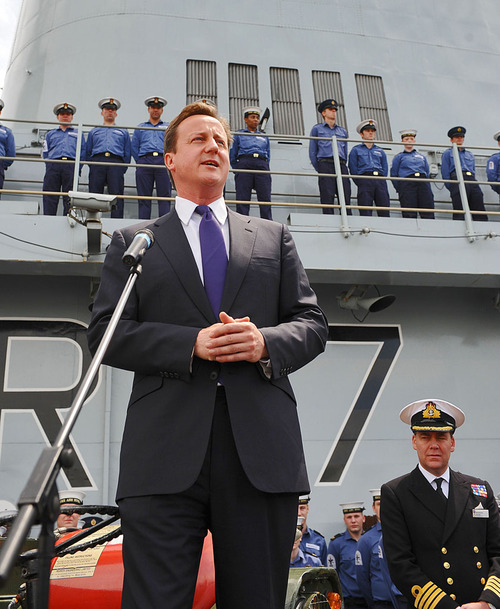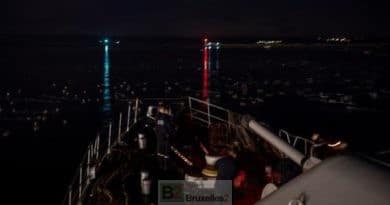The British Army under the ax

(updated 20 p.m.) The “axe committee” has struck. David Cameron, the British Prime Minister, is in the House of Commons this afternoon (16 p.m.) to present the budget cuts affecting the British army. According to the latestleaks", this will be subject to a reduction of approximately 8% of the budget (the Treasury asked for 10%, the Minister of Defense did not want more than 4%). 3 billion of £ out of an annual Ministry of Defense budget of £37 billion. NB: the overall deficit of the British budget amounts for the fiscal year 2009-2010 to 155 billion £.
On the equipment side, the renewal of the Trident nuclear strike force could be postponed until 2015 (at least). This would save £750 million, the government estimates. But the navy seems hit hard.
The Navy in the firing range
The aircraft carrier Ark Royal will be "dismantled with immediate effect", thus announces Sky News. The construction of two aircraft carriers - HMS Queen Elizabeth and HMS Prince of Wales - is confirmed. Cost: around £5,2 billion (it would have cost more to stop the order). But their future destination is still unclear according to our British colleagues. They will be converted to be available from allies. One of them could eventually be sold... (to the French :-). Harrier jets will be retired from service. During this interlude, which will last several years, the Royal Navy would therefore no longer have as many possibilities of launching planes from the sea, and will have to rely more... on its American and French allies, as the Minister of the Liam Fox Defense who considers that his means are preserved (with the JSFs, Tornados and Helicopters, listen on the with the BBC). The Navy could also lose part of its maritime capacity with a drop from 24 to 19 ships. 4 frigates and 1 Bay-class amphibious support ship will be retired. But there will be 6 new destroyers Type 45 and the new frigates Type 26 argues the Ministry of Defense.
The Royal Air Force (RAF) will also pay its tribute to the reform with the closure of several air bases even if the number of Tornado squadrons could be saved. The number of JSF F-35s ordered will decrease drastically. We are talking about 40 JSF ordered out of the 138 planned! While the Nimrod MRA4 reconnaissance aircraft program could be abandoned. The Hercules transport aircraft will be retired 10 years earlier when the A400M capability becomes operational. As well as the VC-10 and the three TriStar variants replaced by the A330 MRTT.
The Army is deprived of 40% of its capacity in tanks (Challenger 2 tanks) and 35% in heavy artillery. But in the end, she doesn't seem to be doing too badly. No regiment will not be removed as long as operations in Afghanistan last, said Liam Fox, the Minister of Defense.
On the personal side, we are talking about 5.000 fewer men in the RAF (33.000 by 2015 and 31.500 by 2020), 5.000 in the Navy (i.e. 30.000 sailors and personnel by 2015, 29.000 by 2020) and 7.000 in the army (i.e. 96.000 soldiers by 2015 and 94.000 by 2020). The civil staff of the ministry will be reduced by 25.000 people.
Public concerns
For the past few days, headlines have followed one another and exchanges between political leaders have filtered through the press. "Is the Navy really necessary?" recently wondered Financial Times, highlighting that we are currently celebrating the 205th anniversary of Trafalgar's victory. Because British pride is melting visibly: endowed after the Second World War with 2 ships and 900 million men, it had, at the beginning of 1, only 1980 ships and 70 men. And soon more than twenty ships. "The Royal Navy will be without means to save the Falklands as it did 28 years ago" added Sir Jonathon Band, the former First Admiral of the Fleet in The Sun. "Do you agree with the shelving of HMS Ark Royal" wonders the with the BBC Today. Defense Minister Liam Fox even sent a rather abrupt letter to the Prime Minister (1). Even the American allies went there with their little word. Robert Gates and then Hillary Clinton were thus publicly concerned about the reduction in the size of the British army. "I think we do have to have an alliance where there is a commitment to the common defense" explained the US Secretary of State on the BBC before the weekend. To the point that Prime Minister Cameron felt obliged to speak directly with Obama on Monday to explain to him how much the United Kingdom will remain "a strong ally". And that the UK will stay above the 2o/o mark set by NATO.
Lively exchanges between "terrains" and "sailors"
Particularly lively exchanges also took place within the Ministry of Defence, in particular between "terrains" and "sailors". Which should leave some marks. Navy commanders did not hesitate to accuse their Army colleagues of using methods of "black ops"(clandestine operations) to promote their interests in Whitehall (the street of ministries) and in the media."We won't forget it and we can never forget it"explained an officer in the Daily Telegraph. In response, an "earthling" accused the sailors of "tuxedo a crack pipe". Atmosphere! Each came, in turn, to explain, to politicians and in the media, why the reduction was more justified in the other. The Navy has "agreed to sacrifice part of its amphibious fleet to safeguard its aircraft carriers"explains a landlubber"Which means the end of the Royal Marines"Should We Talk"useless ghost HQs, redundant senior officers and £800m spent on the future armored car without ever seeing a bit of it"replies a sailor... Atmosphere!
A new European balance
This strategic review could lead to an upheaval in the European organization which, if it continues, could change the strategic deal on the continent. Thanks to this budget reduction, France could, in fact, overtake the United Kingdom and thus become the EU Member State which devotes the most resources to Defence, whether in terms of percentage of GDP or net amount, or soldiers under arms.
NB: for read the final MOD statement published on October 19



Comments closed.